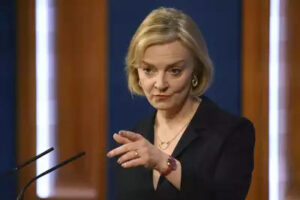 MOON Desk: British Prime Minister Liz Truss on Thursday announced her resignation just six crisis-filled weeks after taking office, becoming the shortest-lived premier in UK history.
MOON Desk: British Prime Minister Liz Truss on Thursday announced her resignation just six crisis-filled weeks after taking office, becoming the shortest-lived premier in UK history.
The Conservative party vowed a rapid election to have a new leader chosen by October 28, avoiding the drawn-out contest in which Truss defeated Rishi Sunak over the summer following Boris Johnson’s own resignation.
Truss admitted she “cannot deliver the mandate” on which she was elected, after her right-wing platform of tax cuts disintegrated and as many Conservative MPs revolted.
Labour leader Keir Starmer, whose opposition party has surged in opinion polls on the back of Truss’s short, eventful tenure, demanded a general election “now”.
“This is not just a soap opera at the top of the Tory party,” he said, warning of “huge damage” to the UK economy, although the pound surged against the dollar after Truss’s dramatic announcement.
Speaking outside 10 Downing Street, Truss said she would stay on as prime minister until a successor is chosen to serve as Tory leader.
“We’ve agreed that there will be a leadership election to be completed within the next week,” she said, after senior backbench MP Graham Brady told her the game was up.
“This will ensure that we remain on a path to deliver our fiscal plan and maintain our country’s economic stability and national security.”
Without going into details, Brady told reporters that the new leader would be in place by Friday next week, in time for finance minister Jeremy Hunt to deliver a crucial budget statement on October 31.
Brady’s statement suggested the party could find a way of bypassing the Tory rank and file who elected Truss, in the face of warnings by Sunak that her debt-fuelled programme threatened higher inflation and market turmoil.
– Sunak the favourite –
Sunak’s warnings were vindicated, and the former finance minister quickly emerged as the bookmakers’ favourite. But he remains held in deep suspicion by Johnson loyalists.
Johnson himself was eyeing a comeback, the Times and Telegraph newspapers reported, despite remaining deeply unpopular with the electorate for the many scandals that brought him down.
“Time to come back,” trade minister James Duddridge, Johnson’s former parliamentary aide, tweeted with the hashtag #bringbackboris.
“Few issues at the office that need addressing.”
Another potential runner is senior cabinet member Penny Mordaunt, who narrowly failed to make the Truss-Sunak runoff this summer.
The end for Truss came after a key minister resigned and many Tory MPs rebelled over an important vote in chaotic scenes at the House of Commons late Wednesday.
By Thursday morning, more than a dozen Conservative MPs had publicly urged Truss to resign, after her tax-cutting plans caused a market meltdown during an already severe cost-of-living crisis.
Many more were reported to have submitted letters to Brady calling for Truss to be removed, although party rules would have forbidden another leadership campaign for 12 months.
“The prime minister acknowledges yesterday was a difficult day and she recognises the public wanted to see the government focusing less on politics and more on delivering their priorities,” her official spokesman told reporters.
Barely two hours later, she quit, and will fall well short of Tory predecessor George Canning who served 118 days as prime minister in 1827 before dying in office.
– Russia not impressed –
Amid Russia’s war in Ukraine and growing economic problems, Britain’s allies have been observing the tumult with concern, with political instability recurrent since the country voted in 2016 to quit the European Union.
US President Joe Biden vowed to “continue our close cooperation with the UK government” on shared challenges including Ukraine.
“It is important that Great Britain regains political stability very quickly, and that is all I wish,” French President Emmanuel Macron said.
Irish premier Micheal Martin said the need to resolve post-Brexit tensions in Northern Ireland was “ever more urgent” under Truss’s successor.
For its part, the Russian foreign ministry said Britain has “never known such a disgrace as prime minister”.
Events reached a head after what right-wing tabloid The Sun called “a day of extraordinary mayhem” on Wednesday.
Interior minister Suella Braverman left, apparently at Truss’s demand after she sent a government document in a personal email.
But Braverman, an arch right-winger who enjoys strong support among the Tory membership, used her resignation message to attack Truss in blistering terms.
There then followed farcical scenes in parliament as many Tory MPs rebelled against the government’s demand that they drop the party’s manifesto commitment to maintain a ban on fracking.
Accusations swirled of heavy-handed efforts to whip MPs into line, some of whom later briefed the media that it was the nail in the coffin of the Truss premiership.





